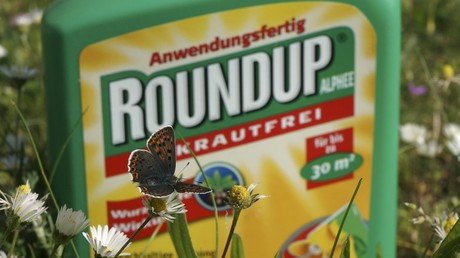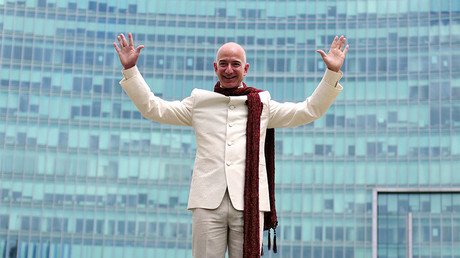Bayer facing second trial amid claims weed killer bought from Monsanto causes cancer
German chemicals and pharmaceuticals giant Bayer is set to face a second US trial over allegations that its glyphosate-based weed killer Roundup causes cancer.
This is six months after the company was rocked by a $289-million verdict by a California state court.
According to Reuters, a lawsuit by California resident Edwin Hardeman against Bayer was scheduled to begin on Monday in federal rather than state court. The trial is also a test case for a larger litigation. More than 760 of the 9,300 Roundup cases are consolidated in the federal court in San Francisco that is hearing Hardeman’s case.
Also on rt.com Monsanto’s Roundup raises cancer risk 41%, EPA-linked scientists findThe company denies all allegations that Roundup or glyphosate cause cancer, claiming that decades of independent studies have shown the world’s most widely used weed killer to be safe for human use. It also notes that regulators around the world have approved the product.
Under a January ruling by US District Judge Vince Chhabria, who presides over the federal litigation, jurors in Hardeman’s case will not initially hear all the evidence presented in last year’s California trial.
Chhabria has called evidence by plaintiffs that the company allegedly attempted to influence regulators and manipulate public opinion “a distraction” from the science in the cases. He said such evidence should only go before the jury in a second trial phase if they determined that Roundup caused Hardeman’s cancer.
Evidence of corporate misconduct was seen as playing a key role in the finding by a California state court jury in August that Roundup caused another man’s non-Hodgkin’s lymphoma, and that Bayer’s Monsanto unit failed to warn consumers about the weed killer’s cancer risks. That jury’s $289 million damages award was later reduced to $78 million.
Plaintiffs criticized Chhabria’s order to divide the trial and restrict evidence as “unfair.” They said their scientific evidence allegedly showing that glyphosate causes cancer is inextricably linked to Monsanto’s alleged wrongful conduct.
Glyphosate is the active ingredient in Monsanto’s Roundup, which is the most popular weed killer in the US. Bayer, which bought Monsanto last year, has been rejecting all the accusations and defending the product as safe.
The US Environmental Protection Agency (EPA) maintains that glyphosate is not likely to be carcinogenic. The EPA labeled glyphosate a carcinogen in 1985, but reversed its position in 1991. The World Health Organization’s cancer research agency classified glyphosate as “probably carcinogenic to humans” in 2015. California has listed glyphosate in its Proposition 65 registry of chemicals known to cause cancer.
For more stories on economy & finance visit RT's business section















